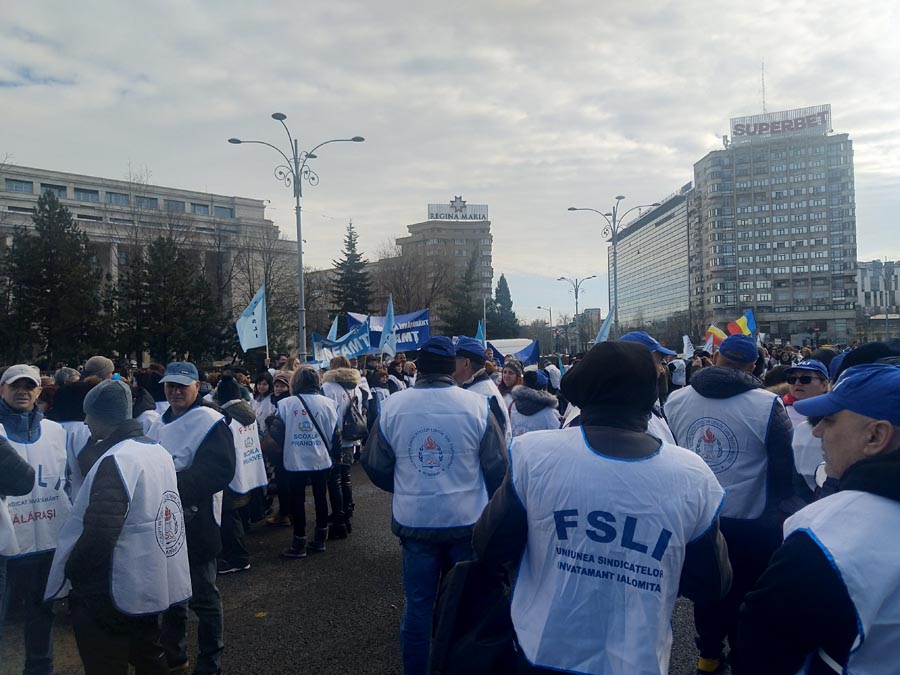This article is based on edited translations of reviously published articles in Română by GAS – Socialist Action Group
In a recent statement, the Federation of Free Trade Unions in Education (FSLI), the Federation of Education Trade Unions FSE “Spiru Haret” and the National Trade Union Federation “Alma Mater”, announced their intention to launch a general strike on May 22. In anticipation of the strike, the trade unionists are picketing the government building. On May 10, a protest march of 15,000 education workers has been announced.
The reason for the unions’ decision is an Emergency Ordinance (OUG), under which the government wants to impose several measures detrimental to employees, including capping staff spending at 2022 levels, denying basic salaries guaranteed to non-teaching staff by the Law 153/2017, increasing staff shortages and blocking training activities. The unionists’ demands are mainly salary-related.
The steps taken by organised education workers are important. We believe that the general strike is one of the most powerful weapons that the working class can use to defend its collective interest. At the same time, we must be aware of the negative role that trade union bureaucracies have historically played in organising these actions.
Compromises and the quelling of struggle as a result of negotiations with governments are a real danger to the advancement of the class struggle. The fulfilment of the workers’ demands must take precedence over any other fake “solution” proposed by the government and those in power. Only in this way can they become aware of the real power of the working people.
The Government’s actions make strike a necessity. The current Collective Labour Agreement, which puts barriers in the possibility of organizing a general strike in education, must be denounced. On the basis of the power to negotiate under conditions of a general strike, the organized workers in education must be able to design together a programmatic content that will be the basis for a broad transformation in Romanian education, in the interest of teachers, employees and students.
We stand by teachers and other education workers in their struggle in this direction. We think that organising solidarity between teachers, non-teaching staff, parents and students is a crucial element of the struggle.
Some background information
On February 1, 2023, we spoke to education staff picketing the government about the problems they face. The condition of education workers is far from favourable: insufficient pay and crises threaten employees’ living standards, the employment contract limits the possibilities of organising a strike, and solidarity between teachers and students is replaced by antagonism which, the protesters say, is deliberately maintained by the establishment.
The protest, an inter-union mobilisation of around a thousand education workers, is based on dissatisfaction with salaries that are inadequate in the context of the cost of living crisis. Although implementation of the framework law was the main demand, several grievances were aired. Protesters stressed the social importance of their work and complained about the underfunding of education, the lack of solidarity among pupils and students and the rising cost of living.
Meanwhile, union leaders have been called in for negotiations and the government has promised to resolve the issue of non-teaching staff pay within 2 weeks. As a result, the protests have been halted. But the promises were empty.
What we share below, and what forms the basis of our observations and proposals, is based on discussions with workers and trade unionists taking part in mobilisations.
Employees’ Living Made Increasingly Difficult
Framework Law 153/2017 establishes a pay system for public sector staff. However, non-teaching staff in the education sector are the only category of public employees for whom the basic salary level has not been raised to the level stipulated in the law for the previous year – this being the main demand of the protest. According to participants, some non-teaching staff do not even have the minimum wage in hand, and many do not get the average wage.
Teachers are not much better off either: they claim that the salary level provided by Framework Law 153/2017 does not reflect the social importance of their work and complained about the risks of epidemiological exposure, for which they did not receive adequate allowances. Teaching salaries have not been indexed, with unionists arguing that they would be capped from 2020, and that previous increases represented payment of older government debts.
Recent crises have pushed education workers to the brink of poverty. An energy bill for 1,300 RON was presented at the protest by an employee whose salary level starts at 1,400 RON.
Underfunding – A Recurrent Issue
Protesters said they had seen a decline in the education system since the 1990s. Underfunding is the main cause, and a lack of equipment, experts and well-trained staff are showing. When it comes to budget allocation, education is the last priority for decision-makers.
The percentage of GDP allocated to education is lower than the government claims, at only 2.1% according to protestors. The figure of 3.2% is therefore a fraudulent representation, calculated by including student fees and other similar revenues. One of the additional demands was to allocate a minimum of 6% of Romania’s GDP to education.
The budget allocated to education is smaller than military spending. Protestors stressed the social importance of their work and of public education. “You open a school, you close a prison,” one of them told us.
Because of budget shortfalls, measures have been taken to reduce staff, which means some workers have been laid off.
No Solidarity Between Students and Teachers
No pupil or student organizations were present at the protest or did show any solidarity with the protest, as far as we know. Organizations with recognized representative status, such as the National Student Council (CNE), have completely avoided the subject.
We tried to find out from the participants where this lack of solidarity comes from. It was explained to us that the system rather maintains a division between students and teachers – a dominant atmosphere in Romanian schools. The responsibility for the relationship with parents or pupils would lie entirely with the school and teachers. But one can easily imagine how a system weakened by underfunding and its consequences is not capable of cultivating such relationships to the benefit of both parties involved.
One participant spoke about the situation in Hungary, where students have staged a series of protests because of the lack of adequate funding for the education system. However, the protesters did not expect such mass movements in the Romanian context.

Leader Invited for Talks, Protests Halted
We asked protesters what they thought about the possibility of a general strike if their demands are not met. It was explained to us that this would be difficult, because some clauses in the Collective Labour Agreement make it very hard for teachers to stage a general strike. Otherwise, there is a risk of the contract being cancelled. Some of the participants therefore believe that the Collective Labour Agreement should be terminated.
On February 8, the FSLI union flagged a new risk for education workers. They may not receive their salaries on time, due to the failure to deliver the EduSal salary calculation software to educational establishments. To avoid further dissatisfaction, the Ministry delivered the software to the units the following day, but with the caveat that it may encounter “unexpected problems” and without the changes contained in the current tax code.
Incremental Change Is Not Enough
As reports from protest participants show, the problems in the education system are manifold, and the failure to adequately remunerate non-teaching staff appears to have been just the last straw. Underfunding, lack of internal solidarity and democracy, and the failure of collective organizing, lamented by participants, will not be solved by simple compromises with the Ministry. In fact, there is no guarantee that the government will keep its promise, or that the final decision will benefit the workers.
The very fact that the protest has led to a series of negotiations and a promise from the Government should not be seen as a sign of goodwill on their part, but rather as a testimony to the strength of the collective organizing of workers. The government fears possible mass movements, which is why it will seek compromises to avoid possible riots and general strikes. The importance of resolving specific problems is not in dispute. However, when the unions decide to accept dirty compromise solutions and stop fighting to benefit from them, this is reflected in the long term in a slowdown of the class struggle – a historically proven reality.
The truth is that power really lies with the working class – not with private exploiters or the capitalist state. No service, public or otherwise, can function without workers. Therein lies real bargaining power, not just the ability to reach various compromises within the system. The working class needs to become aware of this and use its power. Any victory achieved in this way is a testament to the collective strength of the working class.
How to Save the Romanian Public Education System
The Collective Bargaining Agreement restricting the possibility of a general strike must be denounced. It is unacceptable that education workers do not have the option to use their strongest weapon in the fight for their own interests. Denouncing it is the collective responsibility of the employees, as well as the responsibility of the leadership of the unions that are genuinely fighting for them.
Further, we need to mobilize all education workers to strengthen strong trade union organizations capable of carrying out even a general strike when the situation demands it. De-bureaucratization and real democracy are needed within them so that they can be effective instruments of struggle for all employees in the system.
There is a need to cultivate millitant atmosphere inside the unions, and workers should excert real control on them. Strikes can help in that direction. A class consciousness that can link immediate demands to generalised goal must be cultivated among teachers and students alike.
A similar organizational approach is also needed among pupils and students. At the moment, the student movement is monopolized by ultra-bureaucratic bodies that are more concerned with PR and receiving institutional validation than with defending those who they are supposed to represent. Student associations, which have recently been set up in response to this situation, can provide a foundation. Bridges of solidarity must be built between them and the teachers’ unions, because many problems in the system are common and unity is needed. Joint strikes and mobilisations by students, teachers and other staff, occupations in schools and universities and similar actions can provide a level of pressure that cannot be ignored.
Subsequently, within these grassroots organizations, demands with programmatic content can be devised whereby all those involved in public education, employees and beneficiaries, shape an education system according to their needs and under their administration.
The process we are describing is not a simple one, but it is necessary if we are to build a future with dignity in a functioning society. We believe that a public education system that focuses both on professional training and on developing human potential, not on becoming a mere appendage of the free market, is worth the effort.













